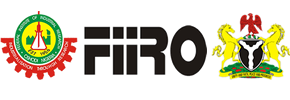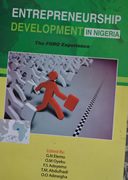Description
Introduction
The founding of the institute dates back to 1953, as a result of the recommendations made by an economic mission sent to Nigeria by the International Bank for Reconstruction and Development known today as the World Bank. The mission observed that industrial research activities in Nigeria were diffused and distorted, with no definite direction.
The mission made several recommendations based on the observations. One of the recommendations made gave rise to the setting up of the Institute of Applied technical Research in 1953. The Institute of
Applied Technical Research was initially located at the Bar Reach in Victoria Island, the present site of the Federal Place Hotel.
The Institute was relocated to the present site at Oshodi, and formally inaugurated in 1956. Then, its name was changed to the Federal Institute at Industrial Research, Oshodi (FIIRO) in 1958. The institute started operations with a staff of 10 in two large wooden buildings, a legacy from the British Royal Airforce.
The institute’s vision statement is “To be the foremost centre for science and technology-based research and development for the industrialization and socio-economic advancement of the nation” while its mission statement is to “To conduct and promote market driven R & D for the industrialization and socio-economic development of the country”
The original mandate of the Impute was to quicken the pace of industrialization in Nigeria.
Specifically, the Institute was to
- Characterize local raw material for use in industries
- Identify appropriate raw material for use in industries
- Identify and develop appropriate technology and assist in their transfer, adaptation and utilization by local enterprises
- Develop indigenous processing techniques into modern technology in the area of food, agro-allied products and in various non-food uses
- Conduct pilot scale operation
- Conduct economic evaluation of projects and consultancy
As expected, the Institute’s mandate has been reviewed several times to reflect the state of the nation and national priority. In 2007, the Federal Ministry of Science and Technology – the supervising ministry,
Reviewed the mandate of the institute, but still the general mandate with some modifications is as follows
- Research and development into food and agro-allied processing technologies
- Research and development into pulp and paper processing
- Research and development into packaging and product design
- Design and fabrication of equipment prototype
Over the years, FIIRO, in fulfilling its mandate has made significant and laudable achievements in R & D into various key industrial sectors of Nigeria. The food and beverages, pulp and paper, textiles, soaps and cosmetics, cement, paints and engineering sectors, to mention a few, have benefitted immensely from these contributions.
The Institute has worked virtually on all the raw materials available (both agro and mineral resources) in Nigeria and has developed matching technologies for each raw material in each of the 774 local government areas in Nigeria.
This book, ‘Investment Opportunities for Job Creation’ based on FIIRO’s Research & Development Results and Available Raw Materials in the 774 Local Government Areas in Nigeria provides firsthand information on raw materials across the 36 states and 774 local government areas in Nigeria including the Federal Capital Territory, Abuja. It is divided into two sections. Section one is a list of available raw materials by State and Local Government Areas, and relevant FIIRO technologies for adoption and commercialization. Section two contains prefeasibility studies/industrial profiles on technologies developed by the institute.
The book is a rich and comprehensive source of information for quick investment decision making, a guide for venture capitalists, entrepreneurs, policy makers, state and local governments, youth empowerment programmes, and a resource material for consultants and researchers among others.
The authors specifically targeted fresh graduates from tertiary institutions with the sole aim of equipping them with relevant information on the available skills acquisition programmes and training workshops available in the institute for the adoption and commercialization of FIIRO technologies.
It is hoped that entrepreneurs, policy makers, consultants, researchers and youth empowerment programmes will take advantage of the information contained in this book for rapid industrialization of the nation’s economy. It is our expectation that this book will propel them into action in setting up micro, small and medium enterprise for the development of the nation. It is also envisaged that governments at local, state and federal levels will take advantage of this document and find it very useful for constituency projects.



Reviews
There are no reviews yet.